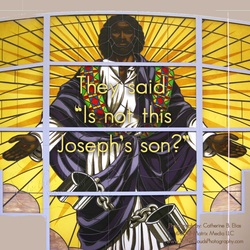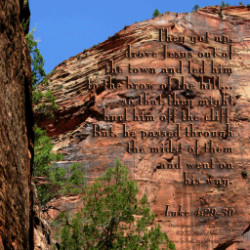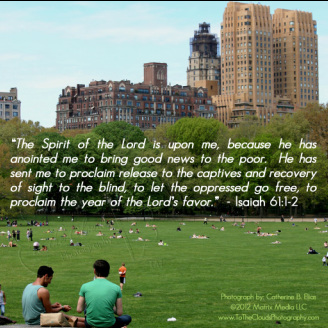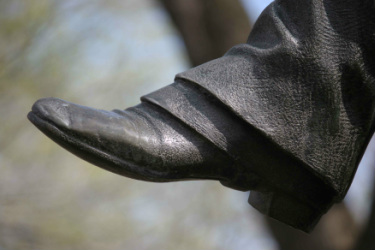21Then he began to say to them, “Today this scripture has been fulfilled in your hearing.” 22All spoke well of him and were amazed at the gracious words that came from his mouth. They said, “Is not this Joseph’s son?” 23He said to them, “Doubtless you will quote to me this proverb, ‘Doctor, cure yourself!’ And you will say, ‘Do here also in your hometown the things that we have heard you did at Capernaum.’” 24And he said, “Truly I tell you, no prophet is accepted in the prophet’s hometown. 25But the truth is, there were many widows in Israel in the time of Elijah, when the heaven was shut up three years and six months, and there was a severe famine over all the land; 26yet Elijah was sent to none of them except to a widow at Zarephath in Sidon. 27There were also many lepers in Israel in the time of the prophet Elisha, and none of them was cleansed except Naaman the Syrian.” 28When they heard this, all in the synagogue were filled with rage. 29They got up, drove him out of the town, and led him to the brow of the hill on which their town was built, so that they might hurl him off the cliff. 30But he passed through the midst of them and went on his way.  This text begs so many questions. And I admit that many of the questions seem offensive to me. For example, is Jesus suggesting that God cares about some people groups more than others. Is he telling his home town that because they act as if they are entitled, they will not receive gifts from God? Are we to hear the congregation accusing Jesus of not being able to heal himself? Is Jesus responding in the defensive? If so, Why? To be honest, Jesus sounds at best like a spiritual leader who has lost his ability to provide a non-anxious presence and at worst, he sounds a little crazy.  And the people are equally crazy. They want to throw him off a cliff? Really? Let's back it up. Jesus reads from the scroll and announces them as his marching orders - his personal marching orders? Their marching orders? What? Who? They answer with the question, "Isn't this Joseph's son?" Let's be honest, we all have people in our lives who will always see us as a child. We have people who helped raise us and no matter the wisdom we offer at the adult table, we belong (to them) at the children's table. Is that what they meant with their question? And then Jesus goes into this rousing monologue about how the prophets of old didn't attend to their "own." What's that supposed to mean? Is Jesus snubbing them? And who are the them really? If they can say, "Don't we know him... Joseph's son?" Can Jesus in turn say the same of them? "I know you - we played kickball in your backyard growing up." Or, come on Aunty, "you were my favorite because you always believed in me." And "uncle, you used to slip us wine after dinner." How well were these folks acquainted? And were they so acquainted with one another that they didn't know one another? My friend Lynn (a fiddle playing preacher whose music can be found here) suggested that we ought to be careful if we think we have Jesus completely figured out. As a way of stretching or challenging or reminding us of the person of Jesus, i offer these final words from the Jesus section of the Brief Statement of Faith of the PC(USA): We trust in Jesus Christ, Fully human, fully God. This week's photos are available for a small fee at To the Clouds Photography.
1 Comment
14Then Jesus, filled with the power of the Spirit, returned to Galilee, and a report about him spread through all the surrounding country. 15He began to teach in their synagogues and was praised by everyone. 16When he came to Nazareth, where he had been brought up, he went to the synagogue on the sabbath day, as was his custom. He stood up to read, 17and the scroll of the prophet Isaiah was given to him. He unrolled the scroll and found the place where it was written: 18“The Spirit of the Lord is upon me, because he has anointed me to bring good news to the poor. He has sent me to proclaim release to the captives and recovery of sight to the blind, to let the oppressed go free, 19to proclaim the year of the Lord’s favor.” 20And he rolled up the scroll, gave it back to the attendant, and sat down. The eyes of all in the synagogue were fixed on him. 21Then he began to say to them, “Today this scripture has been fulfilled in your hearing.”  Central Park, NYC Jesus was led into the desert by the Spirit but comes out of the desert by the power of the Spirit. I've always been struck by that. The power of the Spirit accompanies us out of the desert. And with this power, fame begins to spread about Jesus. You can see the headline, "Local Boy Makes Good." And then he begins to read from the scroll, "The Spirit of the Lord has anointed me..." You? Wait, what did he say? They turn to each other, "Did he just say the scripture is fulfilled?" Wait... what's going on? The Common English Bible translates it, "Today, this scripture has been fulfilled just has you heard it." When the day of Pentecost had come, they were all together in one place. 2And suddenly from heaven there came a sound like the rush of a violent wind, and it filled the entire house where they were sitting. 3Divided tongues, as of fire, appeared among them, and a tongue rested on each of them. 4All of them were filled with the Holy Spirit and began to speak in other languages, as the Spirit gave them ability. 5 Now there were devout Jews from every nation under heaven living in Jerusalem. 6And at this sound the crowd gathered and was bewildered, because each one heard them speaking in the native language of each. Each one heard them speaking. They were able to hear. Jesus makes it clear that day in the synagogue, amongst his own, that its not about what's been said but rather about what's been heard. And so I'm asking myself, what do I hear? When I listen to the prophet Isaiah, as quoted by Jesus in this week's text, what do I hear when Jesus reads his marching orders:
What do I hear? What do you hear? Images available at To the Clouds Photography - |
| All photos are available for a nominal fee at To the Clouds Photography. Simply click on the picture. |
12 :1Now concerning spiritual gifts, brothers and sisters, I do not want you to be uninformed. 2You know that when you were pagans, you were enticed and led astray to idols that could not speak. 3Therefore I want you to understand that no one speaking by the Spirit of God ever says “Let Jesus be cursed!” and no one can say “Jesus is Lord” except by the Holy Spirit. 4Now there are varieties of gifts, but the same Spirit; 5and there are varieties of services, but the same Lord; 6and there are varieties of activities, but it is the same God who activates all of them in everyone. 7To each is given the manifestation of the Spirit for the common good. 8To one is given through the Spirit the utterance of wisdom, and to another the utterance of knowledge according to the same Spirit, 9to another faith by the same Spirit, to another gifts of healing by the one Spirit, 10to another the working of miracles, to another prophecy, to another the discernment of spirits, to another various kinds of tongues, to another the interpretation of tongues. 11All these are activated by one and the same Spirit, who allots to each one individually just as the Spirit chooses.

To the Clouds Photography by Catherine Branyan Elias
So the one Spirit is the reason one can claim "Jesus is Lord?" In other words, the Spirit is how God gets it done - it in that sentence is faith. And so am I right then to wonder about those to whom the Spirit has not yet gifted with faith? If it's a gift and not something I can muster on my own, can I really judge another who has a hard time believing in the existence of God, or the importance of Jesus? In other words how much of membership in the Body of Christ is our own doing? How much is the Spirit's doing? Don't look now, but it seems this passage says it's all about the Spirit.
Western Christian orthodoxy says that the Spirit "proceeds" from the Son. We don't have the Spirit except for the Son giving her to us... or leaving so that God could give her to us. But here it seems that it is the Spirit who gives us faith in the son, or recognition of the son, or understanding of the son.
Eastern Christian orthodoxy lacks the filioque clause, "proceeds from the Son." In Eastern Christian orthodoxy, the Spirit proceeds from the Father; the Spirit acts in the world without the interaction of Jesus/son. Does that then mean that the Spirit is out there doing things that are not connected to Jesus? Does that mean that God is doing things, that God is working outside of the Christian sense of how God works: through Jesus Christ, our Savior?
I've always found it useful to remind myself that my Eastern orthodox brothers and sisters are just that... brothers and sisters. That the Christian church is vast in its expression of God and this key passage from the apostle Paul, spoken to first century Christians who had shed pieces of their former religious selves were learning to trust the One Spirit. How am I learning to trust the one Spirit, even (or especially) when she works outside the realm that I expect her to?
The photo that we've chosen this week reminds me of the mysterious nature of the Trinity - three entities, three persons, three reflections. You may purchase this photo for use in worship or for use in your bulletin directly HERE.
Western Christian orthodoxy says that the Spirit "proceeds" from the Son. We don't have the Spirit except for the Son giving her to us... or leaving so that God could give her to us. But here it seems that it is the Spirit who gives us faith in the son, or recognition of the son, or understanding of the son.
Eastern Christian orthodoxy lacks the filioque clause, "proceeds from the Son." In Eastern Christian orthodoxy, the Spirit proceeds from the Father; the Spirit acts in the world without the interaction of Jesus/son. Does that then mean that the Spirit is out there doing things that are not connected to Jesus? Does that mean that God is doing things, that God is working outside of the Christian sense of how God works: through Jesus Christ, our Savior?
I've always found it useful to remind myself that my Eastern orthodox brothers and sisters are just that... brothers and sisters. That the Christian church is vast in its expression of God and this key passage from the apostle Paul, spoken to first century Christians who had shed pieces of their former religious selves were learning to trust the One Spirit. How am I learning to trust the one Spirit, even (or especially) when she works outside the realm that I expect her to?
The photo that we've chosen this week reminds me of the mysterious nature of the Trinity - three entities, three persons, three reflections. You may purchase this photo for use in worship or for use in your bulletin directly HERE.
15As the people were filled with expectation, and all were questioning in their hearts concerning John, whether he might be the Messiah, 16John answered all of them by saying, “I baptize you with water; but one who is more powerful than I is coming; I am not worthy to untie the thong of his sandals. He will baptize you with the Holy Spirit and fire. 17His winnowing fork is in his hand, to clear his threshing floor and to gather the wheat into his granary; but the chaff he will burn with unquenchable fire.” 18So, with many other exhortations, he proclaimed the good news to the people. 19But Herod the ruler, who had been rebuked by him because of Herodias, his brother’s wife, and because of all the evil things that Herod had done, 20added to them all by shutting up John in prison.
21Now when all the people were baptized, and when Jesus also had been baptized and was praying, the heaven was opened, 22and the Holy Spirit descended upon him in bodily form like a dove. And a voice came from heaven, “You are my Son, the Beloved; with you I am well pleased.”

I'm caught by the "wondering" of all the people whether or not John is the Messiah. He's offering encouraging words - which happen to be rather "hell, fire and brimstone." They're black and white and that often makes people feel safe. The personal question for me is "what encouraging words am I listening to right now that I'm confusing with salvation?"
A Buddhist might say it this way, "Don't confuse the finger for the moon."
A Buddhist might say it this way, "Don't confuse the finger for the moon."
Search this blog for a specific text or story:
I am grateful for
Textweek and
Liturgylink
These are weekly reflections mostly about the texts on which I am preaching this upcoming Sunday. My congregation is Grace Presbyterian Church and if you want to hear the final sermon, check out our youtube channel.
Archives
January 2017
December 2016
October 2016
September 2016
August 2016
July 2016
March 2016
February 2016
December 2015
September 2015
August 2015
July 2015
May 2015
March 2015
January 2015
December 2014
November 2014
October 2014
September 2014
August 2014
March 2014
February 2014
January 2014
December 2013
November 2013
October 2013
September 2013
August 2013
July 2013
June 2013
May 2013
April 2013
March 2013
February 2013
January 2013

This work is licensed under a Creative Commons Attribution-NonCommercial-ShareAlike 3.0 Unported License.



